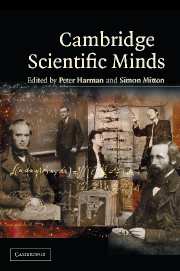Book contents
- Frontmatter
- Contents
- Foreword
- Introduction
- 1 William Gilbert
- 2 William Harvey
- 3 Isaac Newton: Creator of the Cambridge scientific tradition
- 4 William Whewell: A Cambridge historian and philosopher of science
- 5 Adam Sedgwick: A confident mind in turmoil
- 6 Charles Babbage: Science and reform
- 7 Charles Darwin
- 8 Stokes and Kelvin, Cambridge and Glasgow, light and heat
- 9 James Clerk Maxwell
- 10 The duo from Trinity: A.N. Whitehead and Bertrand Russell on the foundations of mathematics, 1895–1925
- 11 Thomson, Rutherford and atomic physics at the Cavendish
- 12 Hopkins and biochemistry
- 13 Charles Sherrington, E.D. Adrian, and Henry Dale: The Cambridge Physiological Laboratory and the physiology of the nervous system
- 14 Hardy and Littlewood
- 15 Arthur Stanley Eddington
- 16 Paul Dirac: A quantum genius
- 17 Alan Turing
- 18 Francis Crick and James Watson
- 19 Mary Cartwright
- 20 Joseph Needham
- 21 Molecular biology in Cambridge
- 22 The discovery of pulsars – prelude and aftermath
- 23 Stephen W. Hawking
14 - Hardy and Littlewood
Published online by Cambridge University Press: 05 June 2014
- Frontmatter
- Contents
- Foreword
- Introduction
- 1 William Gilbert
- 2 William Harvey
- 3 Isaac Newton: Creator of the Cambridge scientific tradition
- 4 William Whewell: A Cambridge historian and philosopher of science
- 5 Adam Sedgwick: A confident mind in turmoil
- 6 Charles Babbage: Science and reform
- 7 Charles Darwin
- 8 Stokes and Kelvin, Cambridge and Glasgow, light and heat
- 9 James Clerk Maxwell
- 10 The duo from Trinity: A.N. Whitehead and Bertrand Russell on the foundations of mathematics, 1895–1925
- 11 Thomson, Rutherford and atomic physics at the Cavendish
- 12 Hopkins and biochemistry
- 13 Charles Sherrington, E.D. Adrian, and Henry Dale: The Cambridge Physiological Laboratory and the physiology of the nervous system
- 14 Hardy and Littlewood
- 15 Arthur Stanley Eddington
- 16 Paul Dirac: A quantum genius
- 17 Alan Turing
- 18 Francis Crick and James Watson
- 19 Mary Cartwright
- 20 Joseph Needham
- 21 Molecular biology in Cambridge
- 22 The discovery of pulsars – prelude and aftermath
- 23 Stephen W. Hawking
Summary
THE HARDY-LITTLEWOOD PARTNERSHIP
The mathematical collaboration of Godfrey Harold Hardy and John Edensor Littlewood is the most remarkable and successful partnership in mathematical history. From before the First World War until Hardy's death in 1947 these mathematical giants produced around one hundred joint papers of enormous influence covering a wide range of topics in pure mathematics. Whereas many other mathematicians have collaborated on a short-term basis, there are no other examples of such a long and fruitful partnership.
Hardy and Littlewood dominated the English mathematical scene for the first half of the twentieth century. Throughout the nineteenth century, mathematical life in England, especially in pure mathematics, had been dwarfed by developments on the Continent, and although Cambridge had produced some outstanding applied mathematicians, such as James Clerk Maxwell, George Gabriel Stokes, and William Thomson (Lord Kelvin), there were few pure mathematicians of world class other than Arthur Cayley in Cambridge and James Joseph Sylvester in Oxford. The situation changed with Hardy and Littlewood, who created a school of mathematical analysis unequalled throughout the world. As one contemporary colleague observed: ‘Nowadays, there are only three really great English mathematicians, Hardy, Littlewood, and Hardy-Littlewood.’
As frequently happens in collaborative partnerships, the styles and personalities of the two men were very different. Both were mathematical geniuses, completely devoted to their subject, and with many interests in common.
- Type
- Chapter
- Information
- Cambridge Scientific Minds , pp. 202 - 219Publisher: Cambridge University PressPrint publication year: 2002
- 3
- Cited by



